The 4th Comic Con in Thessaloniki started yesterday with Frank Miller as the guest of honour. I am happy to share with you some of the photos of the first day of the convention.
The 4th Comic Con in Thessaloniki started yesterday with Frank Miller as the guest of honour. I am happy to share with you some of the photos of the first day of the convention.
Quentin Coldwater: So “be a magician”? Is that illegal or are you guys trying to take over the world or…?
Dean Fogg: This school exists for a single and timeless purpose – to reveal your innate abilities and hone them to the highest degree. Now, what you do with it after that is entirely up to you. If you want to take over the world, we don’t teach that, but give it a go.
The Magicians, “Unauthorized Magic”, SYFY (2015)
Hello, once again dear readers of the ComicBook Imperative. It has been a long time since we last interacted. I hope that this new blog post finds everyone good! In this long period of time that I didn’t post anything new to the blog, I had the chance to read and watch a lot of amazing stories that I wanted to share with you. I am sure that most of you are familiar with them, but still I hope that you’ll find my take on these stories interesting. So, as for my comeback story I chose Syfy’s “The Magicians”, based on Lev Grossman’s really successful book trilogy.
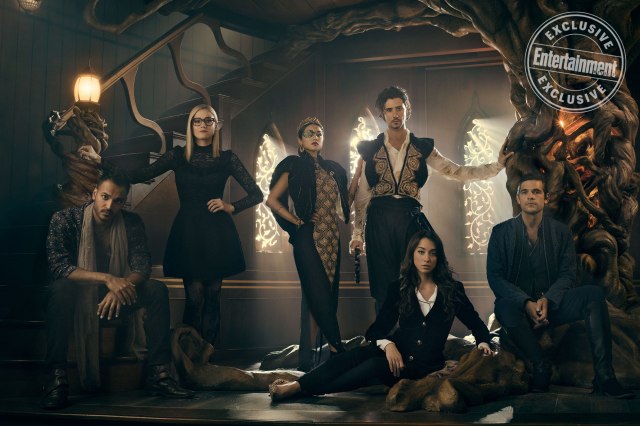
The Magicians, Syfy. From left to right: Penny, Alice, Margo, Eliot, Julia, Quentin.
For starters, the basic premise of “The Magicians” is about the story of Quentin Coldwater who finds himself in an elite magic school, Brakebills University for Magical Pedagogy, where he will be trained as a magician. There he discovers that the fictional world of Filory, from his favorite childhood books, is not fictional, but real and more dangerous than he could ever imagine. At Brakebills, Quentin meets a group of people that will make him challenge everything that he thought was true both about himself and his world. Meanwhile, Quentin’s childhood friend and unrequited love interest, Julia, is denied entry to Brakebills and she decides to search for magic in all the wrong places. Lastly, there is something lurking in the shadows between the worlds, a Beast, and everyone’s time is running out.
This is just the beginning of the wild story of “The Magicians”. In three books and three seasons (a fourth one is coming next year) “The Magicians” explored the spaces the heroes inhabited, but more than that it delved fully and deeply into the characters themselves. Both the books and the TV show were able to address and, to a certain extent, change the rules of what is usually expected from a story that heavily leans on the classic coming off age storyline embedded with fantasy, magic and quests. Lev Grossman, the author of the book trilogy, and Sera Gamble and John McNamara, the creators of the TV series, boldly scrapped the rulebook of the fantasy genre (that is dominated by figures like J. K. Rowling, J. R. R. Tolkien, and C. S. Lewis) giving us a cold, hard look of the reality and perplexity of a world that magic exists. This world is not just beautiful and enchanting and thrilling and full of adventures, but it is also dark and random and mundane and maybe, just maybe, is rooted in the immense pain of the people that live inside it. But the problematic aspect of this world does not lie just in the specifics of magic, but also in the character themselves. We meet the characters at a time when they feel as lost as anyone would feel in their 20s. All of them are charismatic and smart, but that doesn’t change the fact that they have absolutely no idea what to do with their lives. They, also, struggle with their studies, their career prospects, their sex lives, with alcohol, drugs or mental illness. These are all issues that everyone has to face at some point or another. Hence, why all these characters are really relatable. In addition to all these, Quentin and his friends have to find a way to include magic in the already challenging process of growing up. Figuring how everything works out can be a deeply scaring procedure, but it is one that most people experience.
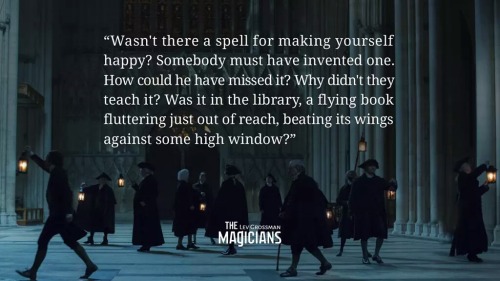
The Magicians, Lev Grossman
The feeling of being lost is accentuated in the world of “The Magicians” due to the lack of villains or wise old men and women that will guide the brave protagonist in order to fulfill a prophesied destiny. The world that “The Magicians” inhabit feels real, because it is really a reflection of the world we live in. In our world, as we get to grow up and, hopefully grow wiser, we get to realize that there are no real villains in our lives and, most likely, no authority, Dumbledore-like, figure to guide our every move so we can stay on path and reach our full potential. We can choose to be good or evil, we can choose the road that leads to comfort or take the path least travelled, but as we get to chose and somewhat “wink it”, the same goes for the ones we seek guidance and advice from. Lev Grossman in his presentation at Google Talks, said: “What if you took away the avuncular adviser figure, which is such a staple of fantasy. You so often have a Gandalf or a Dumbledore or somebody who is there when the main character wonders a little bit off the path or gets confused about what he or she is supposed to be doing, takes them by the shoulders and just says ‘Look, we have this evil ring, it’s a terrible thing and the world is ending, but you see that volcano over there? Just go at the volcano! Put the ring at the volcano and then everything is going to be fine! […] I always felt that there wasn’t nobody in my life in particular who has given me that kind of advice. Or they were, but they were just as full of crap as I was.” And, really, I cannot argue with this assessment. Most of us try to inform our decisions based on what we’ve learned and what we’ve experienced (first-hand or any other way), but at the end of the day we rarely (or ever) get a guiding hand that gives us the opportunity to avoid the big or humiliating mistakes that we will ultimately make. We do not get to have Harry’s assurance that he was walking down the path he was supposed to take from the beginning–and that is probably because there is not a predeterminated path for us to take.
At the same time, Quentin had to face all the hardships of an ever-expanding reality and the terrifying idea that he was not really the chosen one, that he might not be the leading actor in life’s play. The magnificence of “The Magicians” lies in that fact; Quentin may be our way into that world, but as the story progress we get to experience this expanded reality with the addition of more points of view (Julia’s, Alice’s, Eliot’s, Margo’s etc.). Quentin soon realizes that he is not the smartest or the most talented or the chosen one for the adventure he always craved for. His friends become more real and tangible people with just as complex emotions, struggles and desires as Quentin gives them more and more space. And as he is learning that, we get to observe this wider world where not everyone gets what they deserve. A prime example is Julia, who must be one of the most fascinating characters Lev Grossman created (it is interesting to note that behind Grossman’s inspiration for Julia is another Harry Potter character, that of Dudley Dursley). Quentin, by no means, is another Harry or Frodo. And for all of us that grew up in the Harry Potter fever of the late 1990s and 2000s it is easy imagining ourselves as the chosen, the ones above everyone else, the ones that get to have all the excitement and quests. Every other person in our lives could easily get Ron Weasley-ed, being at best a supporting and often one-dimensional character that serves as a mean for us to express our emotions or set our plans in motion (for example, by introducing a villain of the likes of Lord Voldemort or Sauron, the main character finds the necessary driving force in order to embark on the adventure of a lifetime or love interests and friendships sometimes are there just as a way to reflect the feelings of the main character, without much else to offer).
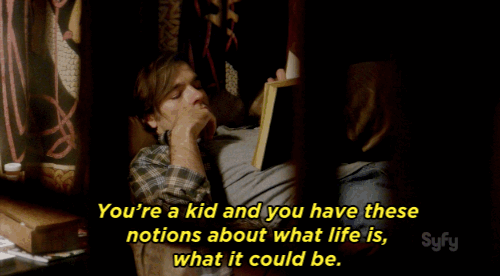
The Magicians, Syfy. Quentin reading Filory and Further.
But as much as any of us identifies with Harry or with Frodo, our lives couldn’t be further away from theirs. Quentin struggles with this idea for a long time. For all of his life he was searching for meaning, something that he couldn’t find in his life before Brakebills, and there he thought he found exactly that. But the disillusionment was not far behind. Quentin’s grapple with mental illness (something that was heavily implied in the books and straightforwardly addressed in the series) caught up with him even in that world he was so passionately wanted to fit in. Even the magical Brakebills couldn’t compete with the allure of Filory, his childhood dream. Quentin cannot “stop looking for the next secret door that is going to lead [him] to [his] real life” and he often has to remind himself to stop waiting. This was his life. There was nothing else. And he had to decide to enjoy it or be miserable wherever he went. Growing up with books like Harry Potter or the Chronicles of Narnia it is easy to imagine that you get to escape from the often mundane everyday life for a world full of magic and wonders. But what Quentin’s story teaches is that even in that magical world everyday life has a way of catching up with you. Magic in the worlds of Brakebills and Filory, however glorious it can be, is also complicated and procedural. It is not just waving your wand, while reciting cool latin phrases. In Grossman’s world, magic was like math and chemistry. You had to know the variables, you had to learn physics and various languages. Magic was organic, a tool, not something completely fantastical. By adopting that perspective, I believe, let Grossman and Gamble and McNamara to make this world more relatable. And, while offered a world to escape to, addressed some serious issues that all of us might get to face at some point or another.
I would love to read what you guys think about “The Magicians”, who are your favourite characters and what are you most excited for the next stories in season 4. As for me, I love Julia, Eliot and Margo! I have to say they are the ones that I am always excited for!
Till the next time,
George
The ComicBook Imperative Guy




Hello dear readers of The ComicBook Imperative! It has been a great time for anime and video games lovers. Netflix launched the much-awaited series Castlevania. Castlevania is an animated show that is based on the Konami video game franchise with the same name and it revolves around Trevor Belmont who must defend the nation of Wallachia from the evil demons and Dracula himself. Because I do not intend to spoil the fun for all of you that haven’t watched the series yet, my entry will be solely focused on the first episode and the premise that builds the world of Castlevania and it becomes the primary force for the progression of the story.
The story begins at 1455 in Wallachia. The first episode of the series, “Witchbottle”, introduces to the audience a young girl named Lisa who wishes to become a doctor. In order to achieve her deepest desire to help mankind move forward, she seeks and finds Vlad Dracula Tepes in his remote castle. Vlad has advanced scientific and technological knowledge and he becomes amused by Lisa’s straightforward approach and her willingness to risk her life in order to become a doctor. In exchange for his help and guidance, Lisa offers to help Vlad to reconnect with his humanity. Vlad and Lisa’s relationship soon blossoms to something more. 20 years later, Lisa found herself accused of witchcraft and got burned at the stake. Upon her last moments, Lisa cries to Vlad that he should be better than the people that burn her and he should show moral character and help them escape from the mist of ignorance that they live in. Vlad, though, was nowhere near her and never heard her last words. Once he returns to Târgoviște, one of the main cities of Wallachia, and finds out about the fate of his wife, Dracula is devastated and decides to wage a war against every single human being in Wallachia, a war against the Church and the Bishop that ordered his wife to be killed. He emerges from the fires that burned his wife and declares a war that would start a year from that fateful day. Dracula warns the people of Wallachia that they should abandon their land or make peace with their fate if they chose to stay. Another year passes and upon the day of Lisa’s death Dracula keeps his promise and releases hell on earth.
Castlevania is really engaging and a show that urges you to watch more than one episode at a time. The writing is intriguing and both the animation and the music score are excellent. One of the central ideas that I want to discuss in this entry is the idea of religious fundamentalism and how it becomes the driving force of the story. Castlevania is drawing its inspiration from the witch trials and the Medieval Inquisition. The period of witch trials was a time of a widespread panic that derived from the belief that witches were trading their life/soul for power that came from the Devil himself. Many people, mostly women, were wrongly accused of being witches and had to suffer through shameful trials and cruel tortures for non-existent crimes. In this case, of course, it would be an omission not to mention the fact that misogyny played a crucial role during the witch hunts and the trials. The god-fearing man could not be blamed for his dark thoughts and sexual desires, so it must be the object of these desires that invokes these feelings against the will of the virtuous and innocent man. Witches entrapped the virtuous men with the help of spells and charms and potions with the guidance of demons and the Devil, so they should be burned for their crimes. It is interesting to note that these feelings echo even in our society. The idea of victim-blaming and rape-culture [women being accused of being dressed provocatively or being intoxicated as the reason for them being attacked] is somehow prevalent and swifts the focus (and the blame) from the person that commits the crime to the victim.
Going back to the premise of Castlevania though, it is not sexual frustration that is the cause of the witch hunts, but ignorance and religious fundamentalism. The dawn of a civilisation based on freedom and scientific knowledge was deemed as the work of the Devil. The Bishop who orders Lisa’s death to some extent knows that she is not a witch and what he found in her house was nothing more than scientific equipment. And yet, he is more than happy to commit this crime in order to instill fear, control his subjects, get more power. He is creating the problem (or at least he is helping it become even bigger) in order to then stand in front of the crowd and declare that only he alone can fix it. While he is standing and watching Lisa burning, he discusses how the Archbishop was not going to live for much longer and the way he is going about it showcases his desire to usurp his place and hold even more of the power of the Church. While the Mayor suggests that all clerics should be comfortable with the idea of death and joining God’s heavenly kingdom, the Bishop admits that he is more interested in shaping Wallachia as God’s country if only he had the chance to burn down everyone who he thinks poses a threat to his vision or considers evil (which are equivalent in his perspective). The Bishop is using religion and faith in order to gain power, influence and control over the people of Wallachia the same way religious fundamentalists do. Religious fundamentalists demand absolute faith, they reject modern theories that stray from the literal interpretation of scripts, ideologies etc and proclaim the need to return to a long lost blissful state of being that people lost due to their wickedness or some other reason they pose as the original sin. Fundamentalists often reject scientific and technological process as they view the findings as threats to their absolute belief system. Science is deemed unholy and the people that practice it have to be stopped.
Castlevania would be just another show that is inspired by gothic literature and the witch trials if only we lived in a world where fundamentalism was not creeping back in our lives. The world seems to be regressing back to certain ideas as a result of the efforts for a more open, inclusive, liberal and just world. One could argue that these periods are almost subsequent of times of great change or turmoil and yet we have to stay vigilant against the new wave of irrationalism, rejection of factual reality and scientific findings. The world of Castlevania may be a purely fictional one, but the danger of religious fundamentalism is a real one, one that is not necessarily that far off reality (as is exceptionally shown in another show this year, the adaptation of Margaret Atwood’s The Handmaid’s Tale).
What do you think about Castlevania?
Keep up with The ComicBook Imperative on Facebook & Twitter as well!
George,
The ComicBook Imperative Guy
Dear readers of The ComicBook Imperative I am happy to share with you the abstract from my presentation for the 8th International Graphic Novel and Comics Conference that will be held at the University of Dundee, Scotland, between 25-29 of June, 2017.
The Marching of Cybermen:
A tale of identity, reality and science fiction
By George P. Stremplis,
Post-graduate Student, A.U.Th.
Scientific Collaborator of the
“Interdisciplinary Centre for Aristotle Studies”, A.U.Th.
Human existence was always confined within the borders of its organic corporal state of being. Transhumanists have long been promising to cross these borders, while they foresee a future based on speculative advances in technology, one of them being the brain reconstruction (or mind uploading) in an artificial/robotic body. Despite, though, Transhumanism’s in favor position of transitioning from an organic body to an artificial one, there is still an essential problem that derives from the implementation of this method.
What I propose is to question whether it is possible for personal identity to survive after abolishing the organic human body for a non-organic one. The boundaries set by the organic body are important factors towards formulating our identity, since the biological aspect of our existence tends to inform the way we perceive ourselves, the world, and reality itself. I wish to underline that by eradicating the biological condition of being for an enhanced mind in a robotic body we face the disfigurement of personal identity. What Homo sapiens will really have in common with Homo cyberneticus? The very core of their existence is going to be completely foreign to each other. So is it really beneficial for humanity to cross the borders of Homo sapiens and turn itself into Homo cyberneticus?
Finally, I wish to address this question under a different scope. The fear of a lost identity as a result of a biotechnological outbreak can be explored by crossing the borders of reality towards the realm of science fiction. Specifically, in the episodes “Rise of the Cybermen” and “Age of Steel” of BBC’s Doctor Who series, Tom McRae is portraying the genesis of this Homo cyberneticus as a result of the literal transfer of the mind in a cyber-body, with personal identity traded for a hive-like mind that abolishes what is conceived as physical and emotional weakness. I believe that by examining this interpretation of Homo cyberneticus within the borders of television we are able to better understand the importance of safeguarding our personal identity against the false prophets of Transhumanism.
It is going to be a thrilling experience and The ComicBook Imperative will be there in order to participate in the Conference and share with you lots of photos and more.
So, if you happen to be in Dundee, come and say hi to me!
George,
The ComicBook Imperative Guy
Hello from your friendly neighbour, the ComicBook Imperative Guy! Just a few week’s from one of Doctor Who’s most intriguing episodes and I am still thrilled about it! Extremis was truly one of the best episodes in recent years! I have to admit that I am still excited with the way they handled all the information, as well as the way they introduced the looming danger that was quickly marching towards planet Earth, the Doctor and his companions.
The 10th season of the BBC science fiction series has been an absolute hit so far, giving us a brilliant Peter Capaldi (finally, getting stories and scripts that are up to his talent) and a new companion, Bill Potts (Pearl Mackie) that is simply amazing! Bill reminds me a lot of Rose Tyler (Billie Piper). She is an everyday girl, she has to face all the issues people in her age have to face (college, job, love and social life etc) and she gets the chance to see the stars and the universe alongside the Doctor himself. The fact that Bill is gay is stripping her relationship with the Doctor from every hint of romance and focuses on a teacher-student relationship that is really engaging. Overall, season 10 has been an absolute favourite of mine thus far (competing with seasons 2, 4, 5 and 6).
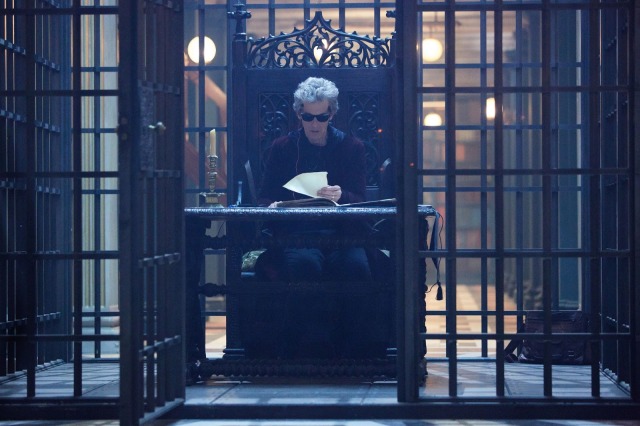
Doctor Who – Extremis – BBC
Extremis, though, was a stand out. The official synopsis was: In the Haereticum – the Vatican’s secret library of blasphemy – there is an ancient book known only as The Veritas. Throughout history, anyone who has ever read it has immediately taken their own life. Now a new translation is online, and the danger is spreading. The Vatican appeals to the Doctor. Will he read The Veritas? But can even the Doctor survive the ultimate truth? And what truth that was. Penned by Steven Moffat, the master of the asynchronous storylines, we have a scenario where reality is nothing but a computer simulation of an advanced alien race, making their war plans in order to find the right time to conquer earth. People that find out the truth about the reality of their existence find the only way out possible: by taking their own lives. The episode was only the introduction of a three-part story that is going to be a fan-favorite for years.
Even though the episode itself is brilliant and there so many things that one could focus on, I decided to write about the core premise of the episode: that is the life in a computer simulation and what that implies about the status of the people inside this simulation. Firstly, it is important to take a look at the reality of this idea. Are we living in a computer simulation? This is a question posed by Nick Bostrom (as well as other philosophers and scientists). In one of his articles his proposes that one the following statements have to be true: “[t]his paper argues that at least one of the following propositions is true: (1) the human species is very likely to go extinct before reaching a “posthuman” stage; (2) any posthuman civilization is extremely unlikely to run a significant number of simulations of their evolutionary history (or variations thereof); (3) we are almost certainly living in a computer simulation,” (Nick Bostrom, “Are You Living in a Computer Simulation,” in Philosophical Quarterly, Vol. 53, No. 211 (2003): 243‐255). The Simulation Hypothesis has been around for years and, as Bostrom noted, the core idea is that reality is nothing but a mere simulation that is so convincing that even the people that experience it cannot tell the difference between actuality and simulation.
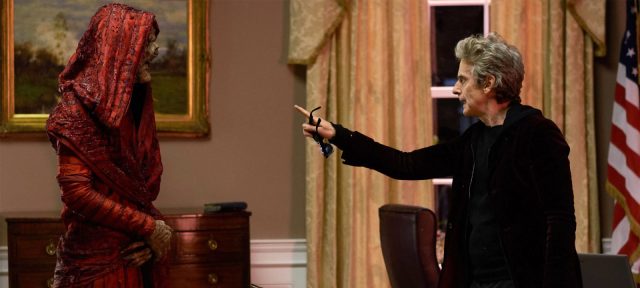
Doctor Who – Extremis – BBC
One of the main issues that arise from a simulated reality is the fact that we might end up with an infinite amount of simulated realities (simulation in a simulation). As long as people do not realise that they are living in a computer simulation, they could end up at the same place as their predecessors of sorts, that is wanting to create the simulation for various reasons (for example to study the trajectory of their evolutionary process or even just for entertainment reasons – most of us are probably familiar with the PC game The Sims, where we could simulate everyday life and activities by controlling our Sim[s]).
I find that it would be interesting to also raise the unavoidable determinism of the simulation hypothesis and how that affects the people living inside it. It seems almost impossible for us to fathom a scenario where every single aspect of our existence is predetermined by a computer programme. Living in a simulated world resembles the various deterministic philosophical and scientific theories. The deterministic aspect of the simulated world stem from the fact that some kind of a super-intelligent AI or a posthuman being created and facilitated the conditions of its existence down to the very last detail. This is an absolute kind of determinism that seems even more tangible than some form of a naturalistic determinism.
What would happen, though, if/when people realised the most well-kept secret in the world is the fact that their very life was just a simulation? Every feeling, every thought, you, the people you love, your life’s work everything is nothing more than just a simulation that someone else runs. And you have no way to access the true information about your existence. Having the experience of creating avatars, sims, or personas online and how quickly one could make them disappear, amplifies the fear of a simulated life. While post-modernism have often pointed out the insignificance of human existence, it is still rather challenging to accept the simulation hypothesis without having to face a real existential crisis.
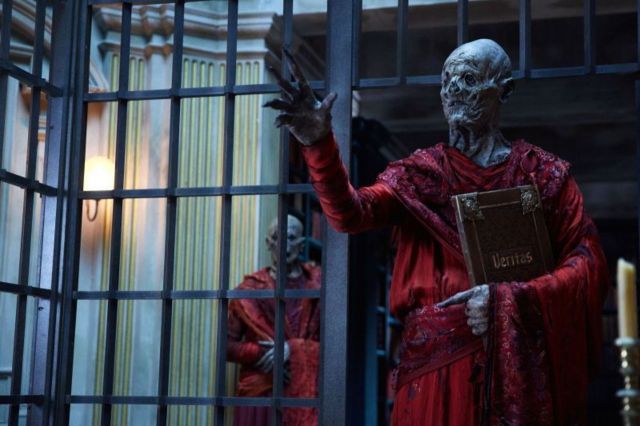
Doctor Who – Extremis – BBC
So, what do you think? Are we living in a computer simulation?
George,
The ComicBook Imperative Guy
It has been quite some time dear friends of The ComicBook Imperative! It’s me, your friendly neighbour, the ComicBook Imperative Guy! This time round, I want to share with you a thrilling show, that I only just had the chance to watch properly. That series is Joss Whedon’s Dollhouse, starring Eliza Dushku. Bit late to the party, I guess! But better late than never, right?
I heard about Dollhouse a few years ago, but I did not have to chance to properly watch and appreciate it. But now, having a background in Ethical Philosophy and Bioethics, I would say it was a thrilling TV experience that I cherish. Joss Whedon and Eliza Dushku had previously (and gloriously) worked together during the run of Buffy the Vampire Slayer, where Dushku portrayed Faith, a rogue Vampireslayer against Buffy’s (Sarah Michelle Gellar) proper slayer. Their artistic chemistry translated well and the audience loved Faith so much that she ended up having a season-long arc and pop-up during the series’ finale and the spin-off series, Angel.
Many years later, Joss and Eliza met up again for a new sci-fi project. That project was Dollhouse. For those of you that you are not familiar with the premise of the show, here’s what you need to know: A major (and shady) corporation offers to young, attractive people the chance to put their lives on hold in exchange for help and money. They assign to them various tasks that they have to complete. But things are not as simple as they may seem. In order to do that, they have to erase every single aspect of their mind and character, to become a blank canvas, and then upload a new personality according to the needs of every customer or task. After the completion of the task, their minds are getting erased again until their next assignment. Every contract lasts for five years, after which they are able to leave the Dollhouse and move on with their lives. The story begins with a young woman being forced to sign that contract and become a doll herself. But what happens when the mind seems to be stronger than the technology used? Well, you gotta watch the series in order to find out! (Beware! Spoilers ahead!)

Eliza Dushku as Echo!
So, as you probably understand already, such a premise full of science and fiction was a delight for me. In a previous post, we discussed about the philosophical and scientific movement of Transhumanism and how its core ideas may become an inspiration for certain genres in popular culture. When it comes to Dollhouse there is a wide range of themes and issues that could potentially ignite a very intriguing conversation about emerging and speculative technologies as well as a new prospect of being for humanity. My main focus here is on the issue of mind uploading and the manipulation of mind/body as depicted in the series, the issue of freedom and the emergence of a new kind of technological slavery.
I would like to start with the issue of mind uploading. Mind uploading has been one of the most controversial speculative technologies that have surfaced over the last few years. The basis of this biotechnological operation is that by creating an extremely detailed map of the human brain by scanning it and uploading it in a mega-computer, one can emulate the original brain and create a conscious mind. This is a theoretical technology that could potentially enable a new form of being, a life that is not confined to the human body. Humanity truly then will achieve everlasting life. This is, of course, a highly controversial subject with many philosophers and scientists suggesting that such a brutal operation like this one (we cannot be sure that the original mind/body could possibly survive this process) might end up harming humanity, instead of actually helping anyone. Our existence is closely (and quite possibly irrevocably) tied with our physical body. Our whole experience of being is filtered by our physicality to a certain extent. An operation that suggests such a drastic alteration of the core of our existence is not only endangering our sense of identity (can we be the same after that operation?), but it is also actively risking our physical life. And while this is a speculative technology that seems to create more issues than those it solves, it is interesting to have a closer look in JossWhedon’s version of it.

“She can be anyone, except herself.”
In the Whedon-verse, the Dollhouse became possible after the invention of a technology that could have a detailed scan of a human brain and that this scan could be saved in hard drives. After this process, the person tied to the contract is being left in a blank and childlike state, until someone installs an artificially created personality (complete with memories, ideas and feelings) in order to be used for various engagements (sexual encounters, heists, negotiations etc). As I noted before, after the completion of the engagement the mind of the “Active” is being wiped until his/hers next engagement. The series focuses on Echo (Eliza Dushku’s character) that starts to retain certain information and memories from every different personality that she had been installed with over her time in the Dollhouse. Over the series, Echo gradually is becoming self-aware and she is able to use all the different capabilities that she artificially gained in order to set everyone free.
Whedon’s idea behind the “Actives” assuming different roles and personalities for every engagement derived from everyday experience in our cybernetic culture. We are standing behind different avatars in social media that enable us to go back and forth between different personalities. But his idea is also a revolutionary (and rather scary) way of looking at the mind uploading technology that some Transhumanist thinkers suggest that we should endorse. In his world, this technology is being used for all sorts of things and this creates a whole new wave of human enslavement thanks to the biotechnological progress. Provided, that you have enough money, you can rent a person that will not pretend to like what you like and be into what you are into, but will be tailored to fulfil and cater to your every desire. As cruel and deranged as it can be, the “Active” will not have a choice but to obey to whatever the installed personality dictates and once everything is done they will go back to the blank state they were before without remembering not even a thing.
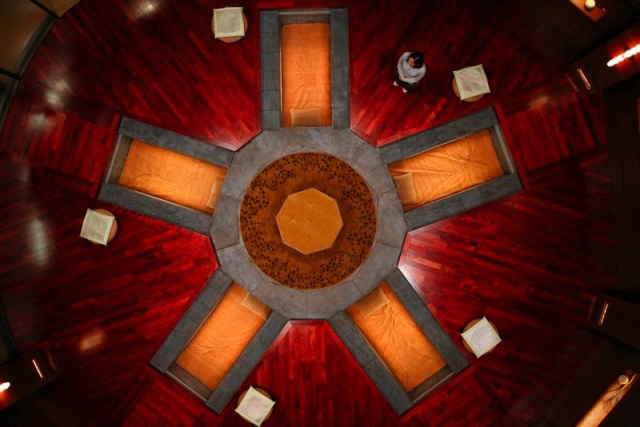
The sleeping chambers of the Dollhouse.
In Whedon’s world the concept of freedom is becoming obscure from the moment people are brought in the different Dollhouses all over the world with promises of providing help in times of distress or financial retribution or even blackmail. Even though they willingly consent and sign the contract, we still have to ask whether this is something ethical and if this was actually a truly free choice. Also, for what things are they responsible during the five years that they are dolls? Being responsible for a certain action implies that you have freely acted. But what does freedom even mean in that world? Echo’s gradual self-awareness is a way of understanding what freedom is in their world and why it is important for her to help the other “Actives” to be free. Whedon boldly showcased that some version of this technology could create a new world, where people can be sold as intricate dolls for other people to play with. This is the ultimate objectification of human kind. A person-no longer being the master of him- or her- self-is manufactured in a way that fulfils someone else’s needs and is destroyed the moment that is no longer needed.
And while this is a rather dark, obviously sensationalist, and sci-fi approach to this kind of biotechnological operation, we still have to consider whether there is any truth to that. Finally, I would like to end this post with one of the most intriguing aspects of Whedon’s story: the fact that Echo (and other characters in minor ways) was able to overcome her conditioning and become self-aware. Apart from the “specialness” of the character, it also shows us that our mind and our body are intertwined in ways that we cannot truly grasp yet and we are not a disconnected body and mind, as Descartes and others suggested in the past. So, before rushing to scan our brains and start living as computers, we need to research and understand the complicate relationship between our minds and our bodies.
I would love to read your thoughts on this subject!
George,
The ComicBook Imperative Guy
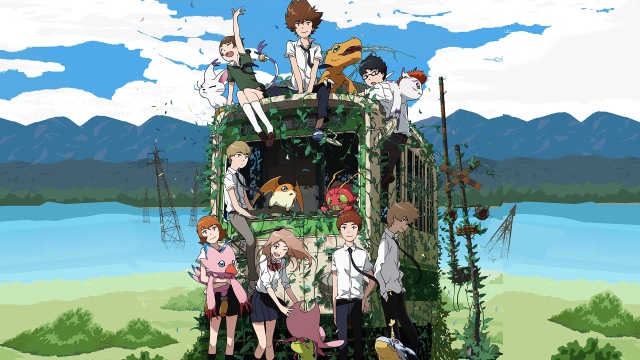
With the premiere of the fourth instalment of the Digimon Tri series, named Loss (喪失 Sōshitsu), I wanted to write about Digimon and the thrill of reviving a much beloved show in the right way, at the right time and for all the right reasons. Firstly, I have to admit that I have been a huge fan of the original Digimon series. For anyone who doesn’t know what this series is about, I will say that it is the journey of eight kids from Japan (the DigiDestineds) who travel in a digital world full of magical creatures that awaited their arrival for a long time. As these kids find their Digimon partner, they embark on a journey that will change their lives forever in ways they could never have imagined that it could be possible. Saving both the digital and our world several times and with the end of the second season our heroes have to part ways from their Digimon partners. Toei Animation, wanting to celebrate the fifteenth anniversary of the Digimon franchise, decided to produce a six-part series in order to tie it with the first two original seasons of the series. The series take place only three years after the events of Digimon Adventure 02 and the DigiDestineds find themselves in a situation where they have to fight again in order to restore the balance both in the digital and our world.
As the story is still going on and we do not really know towards where it’s headed, I decided to write about what I found truly astonishing in the story so far (even though I do promise to revisit the series in its entirety, once it’s concluded). What strikes me the most about this new adaptation is the fact that the creators did not shy away from the aftermath of the adventures and how they affected our heroes. I do believe that shows like Digimon that mainly aim towards younger audiences tend to shy away from the real-life difficulties that derive from situations like the ones the eight DigiDestineds had to face. Unfortunately, by doing that they lose an immense part of the emotional growth of these adventures, as well as the consequences of having to go back to what is considered to be a normal life.
That was never though the case with Digimon. Having been often (and unjustly) compared to Pokémon, Digimon has always been far superior. Even though elements of the story have been similar (as is with every other “Collectible Monsters” series), Digimon was able to surpass the superficiality of the Pokémon narrative and created a deeply emotional world. The creators were not confined to a certain trope of exploring the DigiWorld, but what they wanted was to deliver an adventure that was not just fun and games, but also a journey of self-discovery, friendship, struggle, courage to fight even if the odds are against you and emotional growth.
I was really happy to discover that these attributes that make the story of Digimon so unique were carried on to the new Digimon Tri adaptation. Having watched the first three parts of the six-part series, I found myself in the same place I was as a child watching Digimon fanatically. What was truly astonishing though was that I was not the only one who had changed. It has been a long time since I was nine or ten years old watching Digimon and wishing I could be a part of this story. Sooner or later real life kicked in and I had to be a part of it. I had to be a part of it for all the good and the bad stuff. My struggles growing up though did not alienate me (or any of us, I believe) from the series. I actually think that the connection became stronger because of the fact that it was not just me (or us) that we grew older, but it was the show as well. The creators did not try to recapture the magic and the innocence of the original series (that would be impossible anyways), but they followed their audiences to their journey. Taichi “Tai” Kamiyaand the rest of the DigiDestineds had to grow up as well. Torn between their experiences in the digital world and the reality of their life as normal teenagers, they are not the same people they used to be. And that is okay. Because the people that grew up with them are not the same as well. Creatively it was a bet that seems to have paid off.
One of the central arcs of the revival is the struggle to come to terms with what they have done over the course of their journey, where they are now and where will they end up in the future. As I said in the beginning of this post, we do not have the full story in our hands right now, so I will focus on the re-introduction of two of the main characters: Taichi “Tai” Kamiyaand and Joe Kido. I do want to come back and examine the journey of other characters as well, and I will once the story is complete.
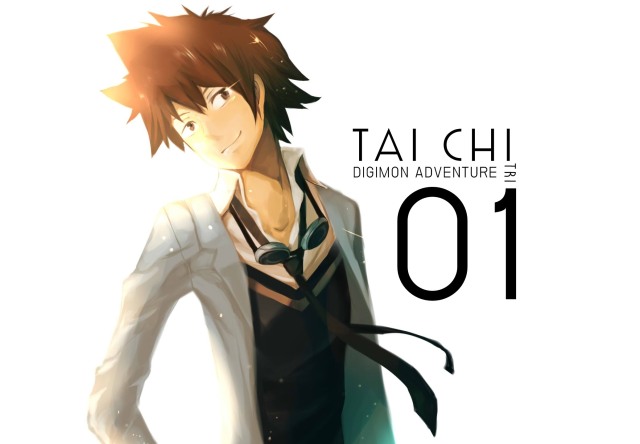
I want to start with Tai, since he has been the leader of the group. As a young boy he was courageous, loud, he would jump head first to every danger, if that meant he could save his friends. Tai was paired with Agumon and together they fought their way out of many situations making them the heart of their group. Tai’s transformation in the Digimon Tri series must be the most radical out of them all. When we meet up with Tai again he is overwhelmed by the issues of his age (drifting away slowly from his old group of friends, adjusting to the life of being a teenager), until a weird disturbance brings forth one of his first foes at the digital world, Kuwagamon. Kuwagamon’s arrival is soon followed by Tai’s partner, Agumon, with every intention to fight the first one back to the digital world. What is new, though, is that we see Tai no longer diving head first to the battle. His excitement to fight, a basic trait of his personality, is now lost in the fear of what his actions as a DigiDestined will do to his world. Tai faced the destruction of the collision of his world and the digital world (for example the events of the “Eighth DigiDestined” arc, when Myotismon and his dark army invaded Odaiba, Japan) and he is paralyzed by the fear of that happening again.
His newfound fear of battle has been a great way to reintroduce Tai’s character fifteen years after we first met him on that summer camp. This narrative gives the chance to the writers a way to explore Tai’s troubled psyche. The trauma of fighting during the events of Digimon Adventure and Digimon Adventure 02 are prominent and Tai has to find a way to overcome it by working hard and reaching out to the only people that can understand him, the other DigiDestineds. What is really interesting is that Tai does not seem ready to do it. He cannot reach out to his friends, he cannot come to terms with what he had to do as a DigiDestined. The fact that Tai cannot accept what he had done in the past is also a major aspect of his inability to reach out properly to his friends and especially to Yamato “Matt” Ishida with whom he had the most intriguing relationship in the original series. Tai has to forgive himself and work through his fear by accepting that his responsibility is to be a part of this group in order to protect both the digital and the real world.
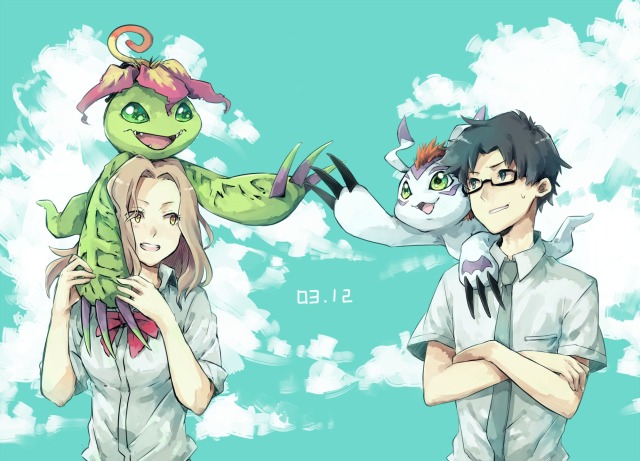
The other character that seems to be overtaken by his struggle in the real world is Joe Kido. Joe had always been the voice of reason of the group. The one that was responsible for the safety of the other seven DigiDestineds. Joe had been a frantic, but reliable character since the beginning. He always exclaimed that his priority was studying in order to become a doctor (something that his parents always wanted for him). We meet Joe again as he is struggling and failing to prepare for medical school. He is solely devoted to his studying and ignores both his friends and his responsibilities as a DigiDestined. I have to admit that Joe (and his partner Gomamon) has always been my favourite characters in the show. Joe never saw the real power in him and that made him a force that was not as reckoned as he should have been. He never gave enough credit to himself.
Joe, as Tai (and everyone else for that matter), has changed a lot since his time at the digital world. Even though Tai has changed drastically since the last time we saw him, Joe’s struggles seem to be consistent with his general character. Joe closed himself off by putting forth the front of getting accepted in medical school and pleasing his parents. This is only part though of what is going on with Joe’s psyche. Joe is still struggling with his self-esteem and he cannot find the reason why he is part of that group. Why he had to be the one that has to fight? He is not accepting his responsibility not out of fear of what might happen to his world (as is with Tai), but because he does not understand why he was chosen in the first place. Joe’s journey in Digimon Tri is one of appreciating his power and using it in order to restore the order in both worlds.
Digimon Tri was able to deliver a great story (a story that is still moving forward) and to celebrate its fifteenth anniversary in a way that only enriches the original series. All the DigiDestineds have to face their lives as normal teenagers (with everything that comes with it), but also to be brave enough to save the digital and the real world one more time. The thrill of going back to a world that you know so well would be enough to make Digimon Tri a success, but by adding to that mix the aftermath of an adventure was something that every fan can cherish. The deep emotional stakes of their struggle to better understand themselves and the world they are living in is something that every person on this planet can relate to.
So, I would like to urge each and every one of you to watch the new Digimon Tri series, relive the magic of the adventure in the digital world and to delve into the emotional world of the DigiDestineds.
I would love to read your thoughts on that subject!
George
The ComicBook Imperative Guy
You must be logged in to post a comment.